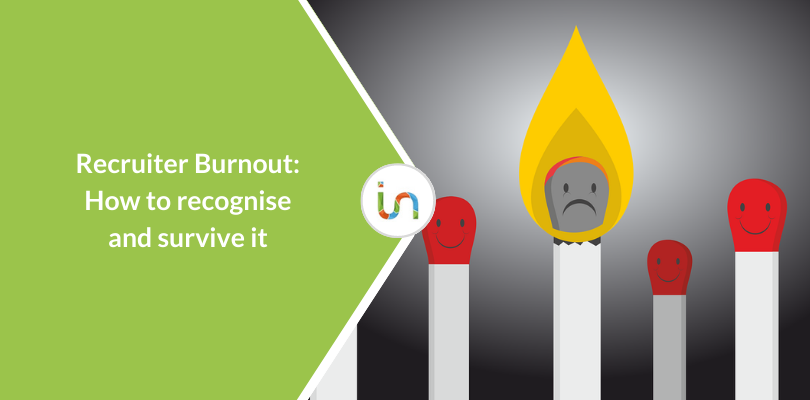
Recruiter Burnout: How to recognise and survive it
Who says that recruiters can’t get burnout? It can happen more often than you think to feel in that state of mental, but also physical and emotional exhaustion where you are at the end of your rope.
According to the WHO, Burnout is a form of work-related stress that needs to be managed and usually affects so-called ‘helping professions’ such as doctors, nurses and teachers. But even recruiters who have to manage staff can be in a similar situation. This is not something to be overlooked, but rather it is good to recognise the signs of it in order to avoid going overboard.
In this article we will take a closer look at what Burnout is, what the main symptoms are, why it also occurs in recruitment, what technology has to do with it and how it can help you survive it.
What is Burnout and why it can affect recruiters
Burnout is an expression borrowed from the Anglo-Saxon world but which has become familiar in our language as well. A synonym of burnout is ‘exhausted’ and occurs when a person experiences great stress at work, which not only prevents them from being clear-headed, but also prevents them from dealing successfully with all their daily tasks.
Burnout sufferers feel drained, exhausted and unable to cope with their daily workload with the resources they have available.
Burnout sufferers realise that they are no longer able to cope with any demands. As we were saying, Burnout affects in particular the helping professions, i.e. doctors, nurses, teachers, policemen, but not only: those who constantly deal with the public. In general, we can say that all those who do a job for which they put themselves at the disposal of others and whose ultimate goal is to solve their problems and ensure their well-being are at risk of Burnout.
The main symptoms of Burnout syndrome

However, before we look at the causes of Burnout in recruiting, let’s see how to recognise its symptoms, which can be varied and not all occur at the same time.
Definitely marking Burnout is the sense of exhaustion and the feeling of having no more energy. You feel drained and disconnected from your work, no longer recognising yourself in it.
One then begins to have a mental detachment from one’s role or to assume negative and cynical attitudes. This is true not only for the job itself, but also for the people one is supposed to help.
In the case of the recruiter, this can become counterproductive towards a candidate and the interview that is being conducted, to the point of compromising the outcome. A similar attitude can also occur with other members of the HR team, with one’s superiors and with people in the company. This obviously results in reduced efficiency which can lead to a collapse of self-esteem.
Other symptoms of Burnout can be
- demotivation
- inflexibility
- resistance to going to work
- difficulty in concentrating
- feelings of guilt, anger, frustration
- agitation
- constant depression
- tendency to isolate oneself
- constant anxiety
All of this can result physically in:
- sense of suffocation or heaviness in the chest
- tachycardia
- insomnia
- headaches
- nausea or digestive problems
- shaking
- sweating
These are just some of the physical signs that the body, as well as the mind, can no longer cope.
What are the causes of Burnout in recruitment?

If you work as a recruiter you have to pay attention to these signs and at the same time identify the causes that can lead to this, so that you know when it is time to stop. These last two years, marked by the pandemic, have hit recruiters hard: for many of them the stress level has increased exponentially, for others it has been a drastic increase.
But what are the causes of burnout for a recruiter?
Here are some of them:
- stress caused by the pandemic affected recruiters in different ways: in some work contexts many of them had to cope with a large amount of work. In general, almost all of them had to reorganise their search and selection processes, digitalising them as much as possible and giving up face-to-face interviews, which not everyone was used to. Those who, in addition to recruiting, are in charge of HR in their organisation have had to deal with unforeseen activities such as organising smart working, monitoring teams even more, figuring out how to design virtual meetings, etc;
- having to adapt to smart working (with even more serious consequences for parents who have found themselves managing their children in online schooling);
- the loss of work-life balance and having turned one’s home into an office;
- prolonged isolation and lack of live-in contact;
- the intensity of work to recruit candidates in a short time or manage all recruitment including digital onboarding;
- threats of staff cuts.
While some of the causes can be related to other jobs, in the case of recruitment it is the type of job that generates recruiter burnout.
For example, it can occur when an HR person feels that he/she will not be able to achieve success in spite of his/her great efforts. Also because, as you know, a lot of things don’t only depend on the type of work you do and how you do it.
For example, recruiters often complain about the lack of resources, and rightly so. Those who find themselves working alone or with a team that is smaller than they should be, are overwhelmed by applications, emails to answer, feedback to send. All this does not help the professional to have that attention to people that should characterise his work.
Moreover, the search and selection process itself can be very demanding and take a long time to assess the best candidates and find the most suitable one. As we know, there are quite a few companies that lose potentially suitable people to a screening process that lasts a long time.
Not to mention that, when it comes to the recruitment process, a lot of data needs to be considered and evaluated and that doing so from multiple sources becomes complex as well as challenging. It is no coincidence that HR Analytics is also a trend for 2022.
From job stress to virtual burnout
Work-related stress can develop into virtual burnout, which is the other side of the flexibility coin. While many employees are unwilling to work for companies that do not offer smart working, what is in fact remote working can lead to considerable stress.
‘Staring at a screen for more than eight hours a day can be counterproductive for a recruiter who, even if he manages to achieve his goals, still finds himself doing a job that is on paper based on relationships, but in fact without meeting anyone.
Not to mention the constant meetings or having to do interviews remotely with all the problems this can entail. To compensate for this, a recruiter can, for example, transform the way he or she holds meetings with his or her team. In what way? Perhaps by deciding to dress everyone in one colour, or use a similar wall as a background, or take a virtual tour of the house, or show off their pets. Another idea to avoid virtual burnout can be to organise fun activities such as sharing a team member’s recipe, having stretching classes together, either at home or perhaps meeting in an outdoor park.
How to survive Burnout: Remedies
There are several ways to survive Burnout. These include setting achievable targets and when targets are set by the CEO or general manager, trying to make it clear why it is not easy to achieve them with the resources you have available. Discussing, rather than willingly accepting, what is required can be a way of avoiding stress in the future.
Another important thing is to be able to delegate and ask for help: people often end up in burnout because they concentrate all their responsibilities and tasks on themselves and end up realising that they are not capable. Building teams with supportive employees at all times is important.
It is also important to get enough sleep and try to find time for private life, even when working from home. This is to avoid making the mistake of thinking that because you are at home, you have to use all your time to work. It is important to set rules, such as going out at lunchtime or in the middle of the afternoon for a walk, playing sport or taking up a hobby. So is avoiding the computer after a certain time, such as after dinner or before going to bed.
How technology can help overcome recruiter burnout
Technology can play a very important if not crucial role in all of this. Among the causes of Burnout we have seen is having to deal with lengthy recruiting processes. ATS software such as In-recruiting can help you to make them more structured and organised, to better manage incoming applications, to send feedback on time. As well as delegating to other people in the team who have access to the platform and can see what you have done so far
In addition, you can better manage video interviews with a platform that avoids all the various technical problems and, last but not least, with software you can better manage the amount of data related to the various candidates. Which is also a great asset when it comes to focusing on internal recruitment or organising a talent pool.
Technology can be the answer to excessive stress and a way to stop in time. Also because a burnout recruiter is not helpful to himself or to the company.
Request a demo of In-recruiting.

Giornalista, content strategist e formatrice
Siciliana trapiantata a Milano, città che ama molto come la sua terra. Giornalista, SEO copywriter, formatrice e amante del live tweeting, scrive per varie testate e blog aziendali di lavoro, risorse umane e tanto altro.
Ha scritto nel 2020 il suo primo libro “Scrivere per informare” insieme a Riccardo Esposito, edito da Flacowski e nel 2021 altri due: “L’impresa come media” e “Content marketing per eventi“.
Ama il mare, la bici, la pizza, i libri, le chiacchiere all’aperto.